We are delighted to announce that the University of Reading has appointed Dr Cathy Tissot as the new Head of Institute of Education. We have said a fond au revoir to Professor Andy Goodwyn, the previous Head of School, wishing him the very best for the future.

Cathy Tissot, Head of Institute of Education
Cathy came to the Institute of Education in early 2008 as a senior lecturer to teach primarily on courses on special educational needs. Cathy was previously the Director of Teaching and Learning, and has also been the Programme Director for the MA in Education and SENCO accreditation programme and the Deputy Director of Research.
Born in Green Bay, Wisconsin, USA (and a lifelong supporter of the American football team the Green Bay Packers), Cathy moved to France in 1990 and later that same year to the UK. Cathy has always had an interest in special educational needs and worked with many children with disabilities while working as a primary school teacher in the United States.
Cathy started a lifelong research interest in autism spectrum disorders through studying for her doctorate at Brunel University which explored the factors that determine appropriate educational provision for children with autism spectrum disorders. Her research focuses on adolescence and the particular challenges that puberty brings to this group of students, as well as the staff that support students with disabilities in schools (SENCOs – Special Educational Needs Coordinators).
A governor at two autism specific schools, she enjoys working with teachers and parents to try and improve services for this group of students.
Vice-Chancellor Sir David Bell said “We are very fortunate indeed that Cathy Tissot is our new Head of the Institute of Education. These are tough and demanding times but Cathy brings the necessary skills and experience to ensure that our Institute of Education remains amongst the country’s best”
On her appointment Cathy said, “I am really looking forward to continuing to work with colleagues at the Institute of Education as well as the broader university and local schools as we navigate through the opportunities that the ever changing government priorities for initial teacher training bring. The IoE’s strong recent REF results are a great success to build on”.





 When you’ve received your results (and we have also received them) you can check the status of your application through the
When you’ve received your results (and we have also received them) you can check the status of your application through the 



